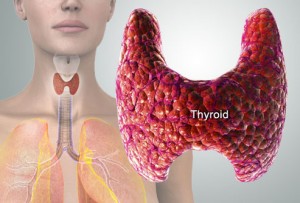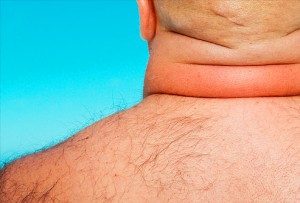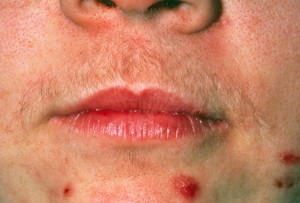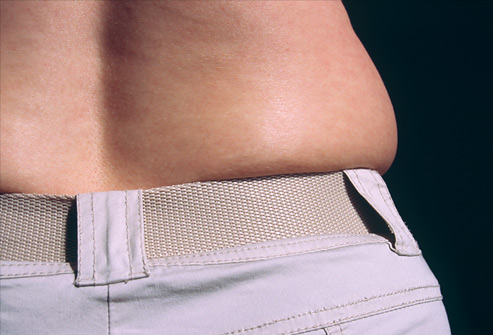 What’s With the Weight Gain?
What’s With the Weight Gain?
If you started taking in more calories than usual or cutting back on exercise, you wouldn’t be surprised if the numbers on the scale crept higher. But what if you’re doing everything the same as you always do and your weight still goes up?
It’s time to delve a little deeper into what else might be going on. With the busy modern lifestyle it is easy to over look some of the little things that may be keeping you from losing weight, and even be putting the pounds back on. Everything from lack of a good nights sleep to daily stress to the medicines used to treat chronic conditions can edge the numbers on the scale the wrong way. Having an understanding of these road blocks can help you and your health care provider to work together for solutions that will help put you on the right track again.
 Sleep Deprived
Sleep Deprived
There are two issues at work with sleep and weight gain. The first is intuitive: If you’re up late, the odds are greater that you’re doing some late-night snacking, which will increase your calorie intake. The other reason involves what’s going on biochemically when you’re sleep deprived.
Not getting enough sleep makes people tired and cranky. Your energy becomes low when you have less sleep. Your brain thinks that the body requires more food to fill your energy. Less sleep boosts your appetite and you tend to eat more. You crave high energy foods like ice cream, cakes and sugar based drinks.
Your body’s ability to process glucose efficiently can be lessened by the effects of sleep deprivation leading to an increased tendency to put on weight. It can also lead to an increased risk of diabetes. A higher level of stress hormone cortisol is produced by sleep loss. Lack of sleep also lowers the metabolic rate which leads to burning fewer amounts of calories.
 The reasons for weight gain due to sleep deprivation:
The reasons for weight gain due to sleep deprivation:
Lack of sleep lowers your leptin, a hormone that suppresses the appetite. When leptin levels are reduced, your body thinks that it needs food even adequate amounts of food already have been consumed.
Lack of sleep increases the levels of a hormone, ghlerin making you hungry. The urge to eat snacks and food during the sleep hours is greater because of the increased production of ghlerin.
These reactions of hormones shows a relation between weight gain and sleep deprivation. When you don’t get enough sleep, leptin reduces and ghlerin increases, resulting in a signal to the brain to eat more.
Tips to overcome sleep deprivation:
- Create a routine. Wake up at the same time and go back to sleep at the same time.
- Plan your day. Use mornings for energetic work. This makes you to relax and fall asleep quicker.
- Don’t take naps for long periods during daytime. This will disturb your circadian rhythm and lead to wakefulness at night.
- You should not eat snacks in the late night. Avoid stimulants such as coffee and tea before bedtime.
- Increase your exercise workout. A good workout increases metabolic rate and enables you to have a good night sleep.
 Stress
Stress
Your job is hanging by a thread, and the credit-card bills are mounting. Your teenager wants to quit school and become a professional snowboarder. Or maybe it’s the increasing tensions in the world, brought to you 24 hours a day on your TV screen, getting you down.
Regardless of the reason, stress is a way of life in the 21st century. And for some people, the effects go beyond feelings of anxiety and discomfort. For these people, stress can mean facing each day ravenously hungry — and adding weight gain to their list of worries. When life’s demands get too intense, our bodies go into survival mode:
The problem, lies within our neuroendocrine system — a brain-to-body connection that harkens back to evolutionary times and which helped our distant ancestors to survive. Though today the source of the stress is more likely to be an unpaid bill than a saber-toothed tiger, this system still activates a series of hormones whenever we feel threatened. These hormones give us the biochemical strength we need to fight or flee our stressors.
The hormones released when we’re stressed include adrenalin — which gives us instant energy — along with corticotrophin releasing hormone (CRH) and cortisol. While high levels of adrenalin and CRH decrease appetite at first, the effects usually don’t last long. And cortisol works on a different timetable. Its job is to help us replenish our body after the stress has passed, and it hangs around a lot longer. It can remain elevated, increasing your appetite and ultimately driving you to eat more.
 Fight, Flee’ — or Chow Down
Fight, Flee’ — or Chow Down
While this system works fine when our stress comes in the form of physical danger — when we really need to “fight or flee”, and then replenish — it doesn’t serve the same purpose for today’s garden-variety stressors. Often, eating becomes the activity that relieves the stress. In other words, since your neuro-endocrine system doesn’t know you didn’t fight or flee, it still responds to stress with the hormonal signal to replenish nutritional stores — which may make you feel hungry.
Following those stress signals can lead not only to weight gain, but also the tendency to store what is called “visceral fat” around the midsection. These fat cells that lie deep within the abdomen have been linked to an increase in both diabetes and heart disease.
To further complicate matters, the “fuel” our muscles need during “fight or flight ” is sugar — one reason we crave carbohydrates when we are stressed.
 Mind Over Matter
Mind Over Matter
As much as we would like to blame all our weight gain on stress, experts say that eating in response to stress can also be a learned habit — one that’s merely encouraged by brain chemistry.
Under stress, there’s an impulse to do something, to move, and often, eating becomes the activity that relieves the stress. During the first couple of days following a stressful event, cortisol is giving you a clue to eat high-carbohydrate foods. Once you comply, you quickly learn a behavioral response that you can feel almost destined to repeat anytime you feel stressed.
Now for the good news: Whether your urge to eat is driven by hormones or habits or a combination of both, research shows there are ways to interrupt the cycle, break the stress and stop the weight gain.
- 1. Exercise. This is the best stress-buster — and also happens to be good for you in lots of other ways. It not only burns calories, when you move your body, even with a simple activity such as walking, you begin to produce a cascade of biochemicals, at least some of which counter the negative effects of stress hormones — as well as control insulin and sugar levels.
- 2. Eat a balanced diet — and never skip a meal. Eat breakfast — and try to consume five small rather than three huge meals a day, with foods from all the food groups. This helps keep blood sugar levels steady, which in turn put a damper on insulin production and eventually reduce cortisol levels — all helping to control appetite and weight. Foods that are high in sugar and simple carbohydrates — like white flour, cookies, cake, white rice, or pasta — cause insulin levels to rise, which in turn increases stress hormones and ultimately makes you feel more hungry. But high-fiber, whole-grain foods — particularly cereals like oatmeal, as well as fruits and vegetables — help keep insulin levels on a even keel, which can help control blood sugar levels, and ultimately, hunger
- 3. Devote time to relaxation — Because it works much like exercise to produce brain chemicals that counter the effects of stress, don’t overlook the relaxing power of cuddling up on a sofa with a good book or magazine, or even playing your favorite movie on the VCR. Anything that makes you feel calm and relaxed will help counter the biochemical effects of stress.
- 4. Avoid caffeine, cigarettes and alcohol — According to the American Institute of Stress, cigarettes, as well as caffeine-laden soft drinks, coffee, tea, and even chocolate, can cause cortisol levels to rise, stress to increase, blood sugar to drop and hunger to prevail. The institute also cautions against drinking too much alcohol, which can affect blood sugar and insulin levels.
- 5. Take your vitamins — A number of medical studies have shown that stress can deplete important nutrients — particularly the B complex and C vitamins, and sometimes the minerals calcium and magnesium. Because these nutrients are needed to balance the effects of stress hormones like cortisol, and may even play a role in helping us burn fat, it’s important to keep levels high. While a good diet will help, taking a high potency multi-vitamin supplement can insure you give your body what it needs to not only deal with the stress, but also burn fat and lose weight.
 Quitting Smoking
Quitting Smoking
Smoking cessation throws our bodies into shock initially. When you quit smoking, a gain of between 5 and 10 pounds during the first few months of cessation is normal. Increased appetite is a side effect of quitting tobacco for most people.
Why do I want to eat more?
- Cigarettes as an appetite suppressant. Smokers often avoid between meal snacking by lighting up. Nicotine is a stimulant, and may also interfere with the release of the hormone insulin. Insulin controls glucose levels in the blood. When this function is blocked, a person will become slightly hyperglycemic, and as a result, the body and brain may slow down the hormones and other signals that trigger feelings of hunger.
- Food as a replacement for smoking. Early on in a person’s quit, the urge to smoke is frequent and uncomfortable. Most of us feel the loss of the hand-to-mouth action of smoking acutely, and food often seems like a reasonable replacement. This can lead to overeating and weight gain though, so it’s better to find a healthier substitute for smoking.
- Dopamine and the urge to snack. Nicotine and food share a common chemical reaction in our brains: the release of dopamine. Dopamine is called the “feel good” hormone because it creates a sense of well-being. When nicotine is no longer in the picture, many of us to turn to food for that boost. The emotional comfort food gives us is a result of this chemical reaction in the brain.
 There are a number of choices you can make to minimize weight gain:
There are a number of choices you can make to minimize weight gain:
- Exercise- Exercise also releases dopamine, so consider using it as a way of improving your mood and minimizing cravings. It will have the added benefit of helping you to speed up a sluggish metabolism and avoid weight gain as well; a win every way you look at it.
- Healthy Snacks- Put snacks together ahead of time so that when the munchies hit, you’ve got good food choices within easy reach
- Avoid Alcohol- Not only is alcohol high in calories, it can be a huge trigger to smoke. For many people, smoking and drinking go together like a hand in a glove. Avoid the empty calories in alcohol, but more importantly, don’t put yourself at risk of relapse by drinking early in your quit.
- One Challenge at a Time- People who are working on weight loss often decide it’s time to clean their lives up in other areas as well. That’s great, but be careful. If you try to do too many self-improvement projects at once, you run the risk of failing at all of them.
Medical Conditions and Age
You could be one of the hundreds of thousands of people all over the world who follow the doctor’s orders, exercise regularly and watch their diets, but continue to gain weight?
If you fit this description, consider the following medical conditions and age related changes which may contribute to your mysterious weight gain – and may have more serious consequences if left untreated.
 Hypothyroidism
Hypothyroidism
If your thyroid (the butterfly-shaped gland in the front of your neck) is not making enough thyroid hormone, you’re probably feeling tired, weak, cold, and gaining weight. Without enough thyroid hormone, the metabolism slows, making weight gain more likely. Even a thyroid functioning at the lower end of the normal range might cause weight gain. Treating hypothyroidism with medication may reverse some of the weight gain.
 Cushing’s Syndrome
Cushing’s Syndrome
Weight gain is a common symptom of Cushing’s syndrome, a condition in which you are exposed to too much of the hormone cortisol, which in turn causes weight gain and other abnormalities. Cushing’s syndrome can occur if you take steroids for asthma, arthritis, or lupus. It can also occur when your adrenal glands produce too much of the hormone, or be related to a tumor. The weight gain may be most prominent around the face, neck or upper back, or waist.
 Polycystic Ovary Syndrome (PCOS)
Polycystic Ovary Syndrome (PCOS)
PCOS is a common hormonal problem in women of childbearing age. Most women with PCOS grow many small cysts on their ovaries. The condition leads to hormone imbalances that affect a woman’s menstrual cycle and can lead to excessive body hair and acne. Women with this condition are resistant to insulin, which may cause weight gain. The weight tends to collect around the abdomen, putting these women at greater risk for heart disease.
Don’t Blame Menopause
Most women do gain some weight around the time of menopause, but hormones probably aren’t the only cause. Aging slows the metabolism, so you burn fewer calories, and changes in lifestyle (such as exercising less) play a role. But where you gain weight also may be related to menopause, with fat accumulating around your waist, not your hips and thighs.
 Drugs That May Cause Weight Gain
Drugs That May Cause Weight Gain
Several prescription drugs have been associated with weight gain. The list includes antipsychotic drugs (used to treat mood disorders like schizophrenia and bipolar disorders), along with medications to treat migraines, seizures, high blood pressure, and diabetes. Work with your doctor to find a medication that treats your symptoms without disrupting side effects.
If You Do Gain Weight …
- Don’t stop taking any medications without first consulting your doctor. Recognize the importance of the drug you’re taking. It may be critical to your health.
- Don’t compare yourself to other people taking the same drug. Not all people experience the same side effects on the same drug. Even if one drug caused someone else to lose weight, the same might not be true for you. Consult your doctor.
- Don’t freak out if the weight gain is just from water retention, which is not permanent weight or fat. Once you’ve finished taking the drug or gotten the medical condition under control, the puffiness from fluid retention may subside. Stick to a lower-sodium diet in the meantime.
- Check with your doctor about another drug you can take. In many cases, your doctor can switch you to another medication that might not have the same side effects.
- Learn if the weight gain is from a decrease in metabolism — from either a medical condition or medication. And if so, take the time to participate in metabolism-raising activities. Get moving!


